The Wisdom Of Dreams With Machiel Klerk
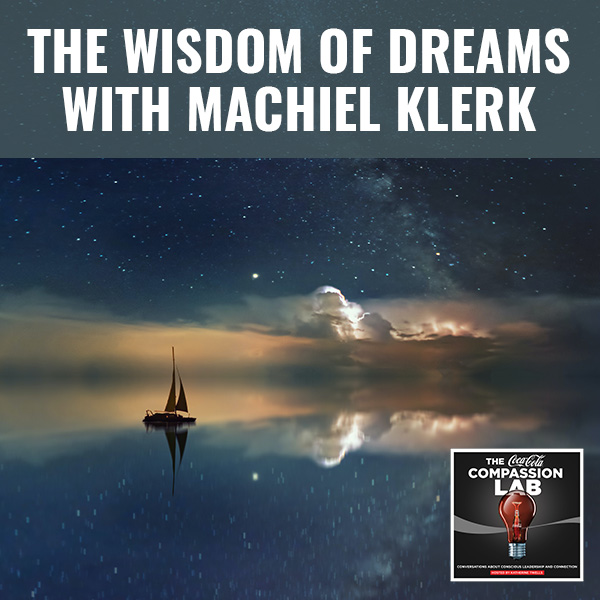
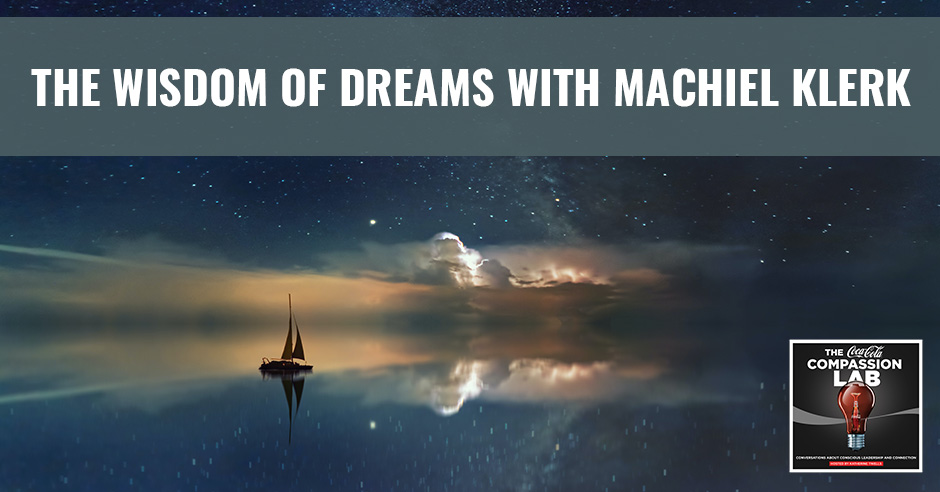
Our dreams are full of symbolism that perhaps only the subconscious mind can ever understand. To have a better idea of what they mean, Machiel Klerk developed a method called dream incubation. Joining Katherine Twells, he explains how talking to your dreams before going to sleep can uncover its messages lying deep within. Machiel discusses how tapping into your subconscious can lead to profound self-discovery, healing from emotional wounds, and unlocking different levels of creativity. He also talks about how dream incubation can help deal with anxieties caused by the pandemic and reconnect with the ancient wisdom that gives you a better idea of your place in the world.
—
Listen to the podcast here
The Wisdom Of Dreams With Machiel Klerk
Finding Guidance Through The Power Of Dreaming
I welcome the fascinating Machiel Klerk. He is a social entrepreneur, mental health therapist, international speaker, dream worker, and published author. His book, Dream Guidance, shows us how we can connect and find guidance from our own inner wisdom through our dreams. He obtained a master’s degree in Counseling Psychology. He has studied extensively the work of Carl Jung.
He has lectured and given workshops in Europe, South Africa, and North America about how we can tap into our dreams to live a more powerful life. He also takes his expertise into the business arena, where he provides inspirational talks and workshops for companies on creativity, innovation, and leadership. He Hounded the Jung Society of Utah, and the online organization Jung Platform, which focuses on providing quality programs for personal development.
He is a true citizen of the world. He moved in his early youth from South Africa to the Netherlands, lived a year in France, and backpacked a year through Asia. Talk about an incredible set of diverse life experiences. It was in 2004 that he decided to relocate to the US, where he still lives and dreams now. You are going to read in our conversation that we are going to talk about a process called Dream Incubation.
Sometimes, with the pace of our lives and our active analytical minds, we can lose touch with some of that deeper wisdom that we carry. We are going to talk about how to get back in touch with that and find a way forward that taps into our intuitive knowing. Without any further delay, I sincerely hope you will enjoy the conversation with the amazing Machiel Klerk.
—
Machiel, I am grateful that you are taking the time to speak with me. We got a chance to meet not that long ago, and I have had a chance not only to get to know a little bit about your work but about you, your kindness, generosity, and, quite frankly, your skill, even as you’ve been working with me a little bit to help me understand more about our topic. I wanted to begin with my gratitude for what you have already shared and what you will share in the conversation. Thank you so much.
Thank you for having me, Katherine, and it is a joy to be with you. I enjoy our pre-conversations and have been looking forward to being in the space with you and musing on dreams, creativity, leadership, and whatever else comes up.
This is the best part of what I get to do because this is how we learn. We learn through being in conversation with each other and learning from each other. In CompassionLab, this is about increasing and expanding our understanding of ourselves. The more we understand ourselves, we are aware of our actions, and how we show up in the world, the more we can understand others and build bridges and connections with each other.
This conversation is beautiful because we are going to talk about understanding and about unlock and how do we get underneath the magic that is not the consciousness that we have, but what is working in the background in our unconscious mind. Before I produce this, I have your bio. I have already shared your bio with our audience, but the bio only tells part of the story. Would you share with everyone your origin story? What happened on your life path? How did you get to do what you are doing now and love it so much?
I got into a one-way street or in a pit in my early twenties. I was somewhat depressed. I had to deal with the grief and loss of losing my dad when I was ten years old. My culture and my family didn’t know how to grieve. We didn’t even talk about it. I learned the hard way that unintended grief gets a person to stop in their tracks. It is a form of trauma that hasn’t been resolved.
In combination with a lack of meaning and no sense of purpose, I was in the dark pit. By chance, I stumbled upon the works of Carl Jung, who wrote extensively about the structure of the psyche and how to connect, relate and understand dreams. I started reading that and looking at my own dreams. At once, I saw that they provided somewhat of a psychological X-ray of where I was.
It points out parts of our psyche that we cannot see but that heavenly influence us, as you refer to. I noticed the dynamics of characters in me that were destructive. Yet, also it pointed out where my life was trying to flow towards. By working with both the destructive parts as aligning with a direction, I got a lifeline out of the darkness, and the dreams wear that lifeline. I have been holding onto that lifeline ever since. Life goes up and downs, but it has been meaningful, and that makes all the difference. That was the kernel where things came together and brought me in this direction.
I have a feeling it wasn’t by chance that you came across Carl Jung’s work. It was destiny that you were meant to intersect with that work. It is interesting to me how in many cultures, certainly here in the US, our lives are often defined by the money we make or the roles and the positions, a very egoic stance. You talk a lot about meaning, purpose, and the power of of that. Why do you think that is important for us to tap into?
The most common way of imagining human life across the planet and history is that we all come into the world with gifts to deliver to our community. Those gifts are surrounded by wounds. We come not as a blank slate into the world, but we come with wounds and gifts. If we align with that, that will translate into our purpose and will give us meaning. If we don’t do that, we will get depressed. Anxious and all kinds of psychological symptoms are little messages from our own soul or self that will tell us we are heading in the wrong direction.
Everyone comes into the world with gifts, and all those gifts are surrounded by wounds. Share on XSometimes we don’t listen to those signals well. We can be stubborn on our journey. We also sometimes don’t want to look at the darkness or the brokenness because we want to look at what is working or what needs to be right or perfect. Only through this level of perfection, maybe, can we gain love and acceptance and all those things. Why do you think sometimes we turn away from the strong lessons that are broken sides, and our wounds can give us too?
It is painful to tend to the wound. It is almost like if you have a wound on your arm and you touch it, it hurts. The natural reflex is not getting close to it yet. The old wisdom says, “Only the wound heals.” It is simple. The notion is that, indeed, the wound is the healer. The wound is what heals. If I have a wound on my right hand and I pretend it is not there, nothing will heal. I have to tend to that wound. That wound is for us, often in the shadow or an area that hurts.
We don’t naturally go there. We don’t live in a culture that tells us, in those shadow areas in the margins, that is where your goal is to be found. The word blessing comes from the French word blessure, which means in French wound. The words blessing and wound are at the core of the same phenomenon.
When you talk about it the way you are talking about it, it makes so much sense. We think about something in the physical, we have to heal it, but yet, in our emotional bodies, we don’t often do that. I mentioned that there is a lot about status in our culture and achieving status, but we also tend to live a lot in our thinking mind and analytical mind. There is a lot of wisdom that we carry that gets drowned out by that thinking mind. We are living in this conscious state. Why do you think tapping into this unconscious world can be powerful for us?
I agree with you that our cultural and natural tendency often is to live in mind and not look at the things that don’t go well. Even one could consider perfection to be more a response to anxiety. We try to be perfect, so we don’t have to feel that anxiety. In terms of psyche, metaphorically, we are a wave on the ocean. The ocean is the large psyche, soul, or spirit that is connected to and we are coming out and made of the same substance as the ocean and soul.
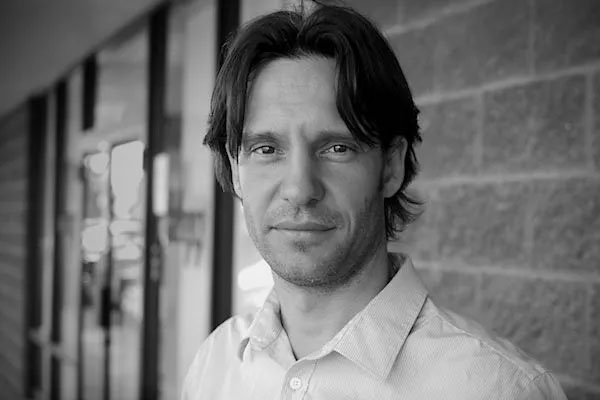
Dream Incubation: Perfection is more of a response to anxiety. People try to be perfect to avoid feeling anxious.
The currents in the ocean are big and huge. They drive that individual wave. Individuals wave with humans, thinking, “I’m in control and I’m doing all these things.” What underneath is massively larger than us, and influences us so much in terms of the direction of our life, which talents we have, the wounds we have, and unless we get in touch with that, it’s going to be a difficult journey in life.
It is almost ironic that the more we think about raising our consciousness and talking about being more conscious, it is required to go into the unconscious to understand the full story. Otherwise, you are getting the tip of the iceberg and not everything that is underneath. You do this via dream incubation, and I’m sure our readers have read about symbolism in dreams or how to think about dreams, but dream incubation is a specific process and a way to go about it. Can you share a little bit about that?
Dream incubation is the old method of asking your dream a question before you go to sleep in order for you to have a helpful dream. This comes back in almost any culture around the world. The earliest writings are already referring to people having figured out that there is some wisdom and creative intelligence in the depths of our being, world, and soul in the universe that we can relate to. We can ask questions. Ask, and you shall be given. This is a specific method of asking the dream a question to get guidance for your life path. That is, in a nutshell, what dream incubation is.
We played around with this before the interview, and it was like, “Let me put this to the task.” We were laughing that I felt like I was remedial or something because I couldn’t remember a lot of my dreams. I am going to be continuing this process and working through it because I believe there is so much here, but why is it? I’m sure I’m not alone when we don’t remember. Sometimes I ask my sons, “Did you have any crazy dreams last night?” They were like, “No. We didn’t dream anything.” I’m like, “Yes, you did.” I’m trying to prompt them to remember, but a lot of times, we don’t. Why do we not remember?
Research shows that we all dream. We have probably between 4 and 7 dreams each night. If you sleep after regular sleep, you at least dream for about two hours. The curious thing, which is that always strikes me curious, is that while asleep, your mind is awake. It isn’t aware that it is either in the dream or that short-term memory isn’t functioning.
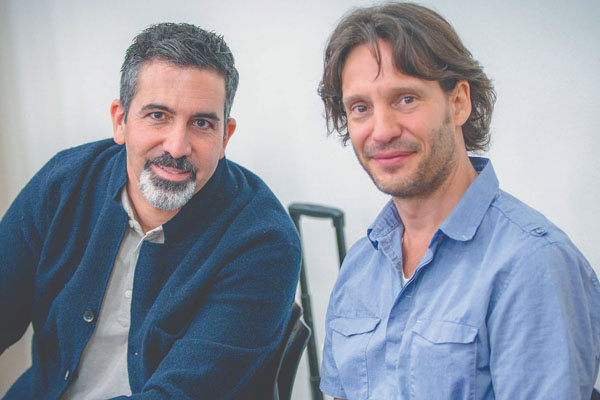
Dream Incubation: While you are asleep, your mind is still awake. It just isn’t aware if it is in a dream because your short-term memory isn’t functioning.
You have all kinds of experiences in the dream. You are walking around driving a car, meeting a crocodile, whatever happened to the dream. The next morning we wake up, and we don’t remember what happened during the night. That is because short-term memory doesn’t work and only kicks on when we wake up. That is also the reason that if you do not write down the dream immediately upon waking up, it is gone.
The crocodile has left the room. That is supposed to be my next question. How can we work on improving memory? I have heard some people go, “Set an alarm in the middle of the night, and you will remember.” I’m like, “I don’t want to wake up in the middle of the night.” How can we remember what we dreamed?
Besides, waking up in the middle of the night, which indeed seems to work, is showing interest. There are two things. One is showing interest in your dreams. That can be as simple as talking to the dream, saying, “Dream, I know we haven’t been meeting much, at least that I know. I would love to remember it again.” The other part, which is also shown in a lot of sleep research and studies, is to give people a piece of paper or a journal and a pencil and put it next to the bed and write down in the morning snippets, “I have no dream, but I feel this weird tension in my stomach.” Weird tension in my stomach. It feels like a little bit of anxiety swirling around. You write that down.
There comes an engagement, and it is almost relational. Most likely, you have 2, 3, or 4 dreams a week if you do that diligently. You can miss a night. If you do it diligently, talk to the dream, maybe create little rituals like laying the candle, saying, “Dream, I would love to have it.” When you have these little snippets, spend a bit of time on it.
A lot of people think, “Dreams are weird. This was so mundane. This didn’t mean anything.” That is the first impulse, but write it down because it communicates to the dream, “Machiel, Katherine, or Johnny is listening.” Somehow we start remembering more dreams. That is the trick. Interest, get a journal, pen, and paper, and keep to it for at least a week.
I love what you said about the snippets, “Don’t discount the little things.” We talked about that earlier. I was like, “I only remembered a piece of it because it is working out.” I’m like, “If I can’t work out for a full hour, I’m not going to work out at all.” Take what you can remember because it could be a piece of the puzzle. Especially there have been times when I have been diligent in journaling where I have gone back and read. I’m like, “I forgot I had that dream.” I would look at what was going on.
What I love about all this work is it is like being a detective. When we do personal work, we might approach it with heaviness. If we can approach it with a level of inquiry and detective nature, like, “What do I need to understand? What could this mean?” This is interesting that it becomes more fun, light, and not necessarily always so heavy. Do you agree?
It’s a great addition to what works for dream recall and personal work, in general. It has also shown that if people are curious, it is hard to be uncurious and anxious at the same time. Curiosity is a great medicine for anxiety. It is also a great way to imagine being a detective and know that a lot of the problems that we have are generational problems or handed down.
It's tough to be curious and anxious at the same time. Curiosity is great medicine for anxiety. Share on XWe are born with a set of qualities, talents, and wounds that doesn’t mean that we, on a personal level, are screwed up. We have a problem that we are invited to engage with but doesn’t say anything about our worth or value, whether we have problems X, Y, or Z. Use to engage with it, and it makes life much easier. You were like, “This is a problem I have.” Let’s be a detective to see if I can crack the code that needs to fix.
As much as we would love to go through life with no problems at all, if we were honest with ourselves, we like the challenge of overcoming problems or figuring them out because there is some satisfaction in doing that. All of this is a part of our own evolution and growth.
Even if you take it further in the game metaphor, if you would play an opponent in tennis or soccer that you always will win 10-0 or whatever. Quickly without some good opponent, the game is not fun anymore.
Let me ask you this because I found this helpful as I was thinking through my own process. You talk about don’t get too caught up in symbolism. If that alligator is in the dream, what does it mean if an alligator is in my dream? More about what is happening or what is happening in that interaction. Can you say more about that? As people go through this process, how do you think about interpreting that experience?
It is especially for people that haven’t spent much time with dreams. Instead of having to Google with this alligator, one says, “It is aggression.” The other says, “It is a mean boss.” The other says, “It is a fantastic instinct.” Before you know it, you have no clue anymore which interpretation to take. If you ask instead of the question, what does this mean, the question, what is happening? You get a storyline.
There was this man, and I will tell a little piece of his dream. He had a dream in which he was driving through a tunnel. He saw a tiger. He thought it was beautiful, but he got scared, slammed on the brakes, and backed out. The question was, what was happening? He says, “I’m moving along in my life. When I see something that I find beautiful, I get scared. When I get scared, I slam the brakes, and I’m out.” You can ask the question, “Where in your life do you recognize is better enough? You are attracted to something, but the moment it gets too beautiful and interesting, you opt out.” He could figure out where that was.
It is different than what does a tiger mean? You mentioned that through the line and what is going on. You can start to understand how it applies to what you are living in your waking life. You have taken this work into the business arena too. We are talking about the personal journey. I certainly feel that all of our personal journeys and the work we do on ourselves have a ripple effect in all of our communities. You mentioned the wave in the ocean. Our interconnectivity means that as we go on this journey with ourselves, the more we impact the collective. You have engaged and helped people unlock levels of creativity and leadership through this process. Can you share a little bit about what you’ve done in that arena?
At that same time, in my early twenties, I got interested in both business and psychology. The god Mercury in the Roman tradition is the god of both merchants and business as a psychotherapist. There is this aspect, and a lot of businesses have a lot of psychology to it. It is the marketing on how to position, work with people, close a deal, manage people, and put out a vision. Therefore, the personal development of management, leaders, or people in business is relevant to their business.
You can see this throughout history. A lot of creative inventions have come through dreams. The largest oil field in Kuwait was in 1937, revealed to a person in their dream. They mentioned that to the Sheikh of Kuwait, they would move their drilling. That made Kuwait the insanely rich country that it is now. It can help find an oil field. I have my own business, Jung Platform, which is an online company on education. That was revealed to me in a dream. It gave a suggestion for building that company.
There are many other ideas for business that come in dreams, but also once people are on their way, how to be more creative, how to be a better leader, how to manage the business better, and this is all in this dreaming consciousness. You can wait for a spontaneous dream. You can ask your dream for help. You can even bring that consciousness a bit into this reality where you are daydreaming more. You become more in the flow, and you become more creative. There are many ways that when you get in touch with dreaming consciousness, that is helpful for personal development and creativity.

Dream Incubation: You can ask your dreams for help and bring that consciousness into reality. This way, you can become more creative and in the flow even while daydreaming.
When you had your dream that created the Jung Platform that you do the online business, were you asking a question? Were you using the process? Did this just come to you? Can you share more about that?
This was a spontaneous, helpful dream. I hadn’t even thought about anything in this direction. In the dream, to summarize it briefly, I’m floating above the Lake of Zurich and I see Carl Jung’s house, which is at the lake. He is building a platform attached to his yard in the water. I see all of that. He is rearranging some beams to make it more comfortable. The whole scene gets to a standstill, and you and the platform disappear. A voice behind me says, “You have to draw it identical to how it was.” I think I can draw. Make a line a little bit more straight than I thought, and I woke up.
I took that as a suggestion to build a platform for Jung’s psychology that builds further on Jung. As with Jung, Jung’s psychology takes into account the unconscious, the soul, or spiritual psychology. We also do African traditions or Buddhism. That has been a vocational dream for a decade plus now. I’m still working on that.
That is amazing because there was so much to that dream while it wasn’t obvious, like, “Machiel, you need to go do this right now.” There was a tremendous amount of information in what that dream was revealing. When you have worked with teams or people who have been trying to drive creativity or leadership, is there a story there that you could share from any one of your participants that they were able to evolve from a dream experience?
I worked with a company where the company was bought by another company. They needed to integrate that new company. They wanted to have the management and the people align better. They noticed that it was not going well. I said, “Let’s see what the dream has to say about this.” In the team, we did a dream incubation where we formulated this question. It was something to the extent of what was going on. How can we get the new company better integrated?
One of the managers who was directly working on this had the following dream. He said, “I’m driving my car. I’m focused to get the car to the endpoint. I’m going somewhere. I’m focused on it. I’m driving on the road, and I drive against a little wall, three feet high, and I can get further. When I’m stuck there, I look around and see a little further and a snake-like river with people in little tubes having fun. They are moving along.” He thought that was his dream.
He thought, “I’m focused on getting where I need to be, and I’m driving into a little wall, but here it shows maybe better how I can get those people along and introduce fun. It is not a straight line. Integrating a new company is maybe a bit more of a serpentine path. Let me connect with them where they are instead of having them meet me where I am.” That shifted his perspective. He reported that it made the other team also much more excited to be with him.
I’m curious. I’m backing up a little bit when you first engaged. Even as we integrate more mindfulness and personal work into the business arena, it is still a pioneering space that hasn’t always been there. We are learning how to bring it in the right way so that it resonates and is helpful. It can unlock things for people. Initially, it can be a little uncomfortable because people are used to going back to what we talked about earlier, a structural, analytical thinking mind formal process. Did you have people in the group that are like, “What are you talking about, dream?” Were they converted by the end? How did that go?
Several people say, “I have never dreamed. My dream is not for me. This is weird.” I invite him to be open. There are many examples in culture. Stephen King uses his dreams for his books. Paul McCartney got the song Yesterday, which is the most-played song in American history on the radio. It is from a dream. By sharing those examples, people pique their intrigue.
Find greater purpose and meaning. That is the biggest fuel if you can find that sense of where you are supposed to go or how to navigate something.
I come in for use at least two days and sometimes three. The next day, there were always several people in the group that had a helpful dream, and everybody was like, “This works.”
Listening to the guys, you are like, “That is amazing.” I am endlessly fascinated by this wisdom. There is wisdom in our bodies. You can go through somatic work and get out of your head. You even mentioned the dream. My stomach was upset or I felt tight in my neck and shoulders. Going back to that inquiry of, “What is going on?” We know much more than we realize. We have to slow down enough and tap into that wisdom.
You mention it is ancient. I find in many conversations around these topics of wisdom and mindfulness. It is not new. We are remembering the things that maybe we lost because we have moved into a modern age, where we have become disconnected from that ancient wisdom. Do you have any thoughts about that?
I share that observation. Our mind has been powerful. It has created the ability to communicate at a distance and record fantastic medical breakthroughs. We are on the moon. We have iPhones and cars. The mind has also become a bit in love with itself. It was like, “How beautiful what comes about.” It also will speed up.
What you mentioned in slowing down, we get in touch with different states of consciousness. Those states of consciousness have an intelligence of their own. The hard knows different things. The gut knows different things. We are learning again that the body has intelligence and how you get into that. I see there is a little jump there. Especially if a work in person with people, we also use the body in dream work.
In slowing down, you can get in touch with different states of consciousness, which have an intelligence of their own. Share on XAnother example. At the company working with their management. They all asked, “How can I be a better manager?” One of the managers asked this question and had a dream in which he saw this newspaper person salesman on the street selling newspapers. He was upbeat, enthusiastic, driven, and excited. He was like, “That is what I’m missing.
By the technique of looking going back into the dream and looking at that man, you get into that field of that man’s energy. He started to feel what it was like to move his body in a different way. All that intelligence that was in his own body, that was already in his dream, he needed to integrate. He started moving like that person. He is speaking a little bit more with passion and a bit more driven. He thought, “Now I also have a body and a state of consciousness that I can practice and add to my existing habitual consciousness.” That is where I came to it. The body is important even in dream work. It doesn’t remain only analytical. How can you infuse that energy into your body, practice it and become your own?
Even as you are telling that story and you are moving your body, I can see the energy in you relaying the story because you were changing somatically along with what you were doing. It is interesting. Let me ask you this. This is a pivot and maybe pan out a little bit. During the whole pandemic and times when lockdowns were going on, we talked about pace a minute ago. How fast do we go? How do we slow down and get in touch with something deeper?
We had an opportunity to do that. Everyone had a different experience during that time. There wasn’t one experience, but in general, a lot of things stopped, the travel and moving on fast. Now I’m in a lot of conversations with people that we have gone back not to what we were, but it is almost faster. Maybe it is the contrast. You work with clients not on the dreamscape but in mental health. What are you seeing? What are your observations of the world? Not that we are out of the pandemic, it is becoming endemic, but coming out of these crazy years. It is not just the pandemic. It is inflation, war, and many stressors. What are you observing in the collective right now?
There are several things that I encounter. One is a certain inflammation enraged state. People watch the news, and they get enraged. People see this president, and they get enraged. People see a dead president, and they get enraged. There is a lot of this polarization. Partly at the base of that lies a certain rage. How to be with the rage that is there? Another part that I see is loneliness. How to deal with people that still constantly work at home? They report loneliness. There was loneliness before in pretty staggering numbers. My experience seems that loneliness has increased by being isolated. That’s a lot of advantages in my community, not so long in my bedroom to my study room.
It is a lot better than the 405 here in California. I can tell you that.
Loneliness and rage are two big emotional states that I see these days.
They are both concerning states because we are wired for connection. In our connection, we learn, grow, and are supported. We understand that we are all on this path together. When you are in too much isolation, it starts to become disorienting and confusing. When you stack the rage on top of that, and everyone reading has seen that in the world, whether on the road or in a grocery store, you were like, “What is happening?” What would you say, other than what we have been talking about on doing your work in the world, that we can continue to heal that collective wound? It is like a shared wound. How do we get better so that we can drive our wisdom and consciousness to a more peaceful place?
Collective change starts in the individual. We all need to take up our own individual work, which usually leads to us doing something for others or bringing it back to the collective. I need to work first on my rage before I go and tell other people not to be the rage or how to engage better with their rage. That is important, or working on my own loneliness.
Collective change starts within an individual. You must work on your reach before telling others how to engage with their own. Share on XWith the loneliness will lie in the shadow. I don’t want to think about my loneliness. I want to eat or drink my way out of it. Those are all kinds of ways of effectively, somewhat destructively, dealing with loneliness. I need to maybe go and spend some time with my loneliness and ride to it and say, “Loneliness, I know you have been there. How long have you been there already?” It will say, “Maybe you remember. I was there already when you were four. Do you remember how you were lonely?”
I can enter the loneliness and even treat it almost like a world or a person. I can start relating to it. Something will change in me because everything that is being rejected cannot change, and the same with rage. The rage is a lot of fire to it. Fire in its helpful form is beautiful, warm, and gives enthusiasm, but if it becomes a wildfire or turns into violence, it is destructive.
There are multiple angles to all of these things. It all comes back to even as we talk about bringing some of these conversations into the business and work world. To me, it’s about the shared wisdom of equipping ourselves with tools and practices to go on the journey. While the journey might be solo to start, that interconnectivity means you are having an impact. Sometimes we can do that together, even with the dream work. As you were working with teams, it’s like, “They are going in their individual asking their own questions.” It is bringing something forth that is helping the entire team or organization.
The moral of the story that we are talking about now and many of the conversations I have been in is don’t be afraid to go into the shadows, to shine the light, to ask the questions, to be your own detective, and know that doing that is far from selfish. It is probably the most positive and giving thing you can do for the world when you can heal your own wounds that way.
I could continue this conversation for a long period of time, but I need to be mindful of your schedule. I have two last questions for you. One of them is if you think about wisdom, and we are talking about wisdom through dreams, is there any piece of wisdom in general that you have acquired in your life that you would want to share with our readers that has been valuable to you?
What comes up for me is in that time in my early twenties when I was climbing out of the pit and this older man told me, “It doesn’t matter so much what you do, but make sure that you do it well and engage with it.” Over the years, I have seen that, indeed, even if I’m in a place where I don’t like so much what I do if I disengage, I keep being stuck. If I engage, some door that I didn’t know will open up. That was because this person saw me work hard and said, “Maybe you are not in the right place here, but I have a job for you there.”
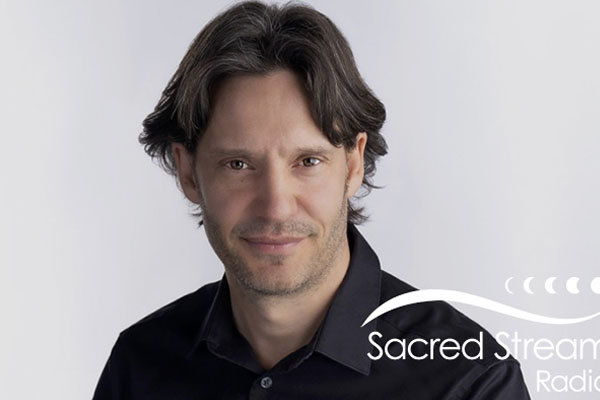
Dream Incubation: Even if you are in a place you don’t like, do not disengage or you will be stuck. Continue moving forward until new doors open up.
Something happens, and that somewhat translates back to saying yes to life. Saying yes to loneliness and rage. Engaging with the wound and with your talents. If you can say yes to it all, life starts getting color. I have noticed that everywhere where I said no to life, it is almost like the internal painter started painting that area of my life gray. I don’t like that. It becomes gray. I like it even less, even more gray. In my case, the color gray means go and engage. You are disengaging there and figuring it out. Saying yes to life in all its facets is some wisdom that I got there. I try to keep reminding myself to do that because it is an ongoing practice that came up for me.
Machiel that is beautifully said. You said a lot of amazing things right there. As you were talking about that saying yes to life and saying yes to the loneliness and the rage and the difficult parts, when you do all that, you are saying yes to the gold and the beautiful parts because that is the road to that wholeness. To us, finally coming to that place of self-love and self-acceptance and even self-celebration, as you get to that place, what is projected out into the world is that love and acceptance of others.
It is a snowball of juicy goodness that happens from there. I love that so much. Thank you for that. My last question is, where can people find you? I know your book Dream Guidance is out there. That will take people through more detail, but where would they go if they want to find you, work with you, and know more?
My website is my name, which is MachielKlerk.com. If you put in Dream Guidance, especially in Amazon and Barnes & Nobles, you will also get to my book. You will find my name. You can go to my website or on my Instagram or Facebook and follow me. I put a little dream suggestion or some snippet of insight several times a week.
On the Jung Platform, we provide over 150 programs on personal development suited for beginners and intermediate, where people can learn about their shadow, synchronicity, personal myth, how projections work or how to have better dialogue, a sense of gift, and purpose. Soon there is a free summit on the shadow. That is all on the Jung Platform. People are welcome to go there. Those are the places where you can find out more about me. Thank you for asking.
It will be in the show notes, and I would encourage everyone to check it out. What a wealth of wisdom on the platform and in the book that we can all share. I want to close again with gratitude where I began for the work that you do, the service that you give, using your gifts to serve others so that we can all take this journey of growth and understanding through dreams and otherwise. Thank you for your time and for sharing all that you did.
Thank you, Katherine. It is a delight to be with you.
Important Links
- Machiel Klerk
- Dream Guidance
- Jung Society of Utah
- Jung Platform
- Dream Incubation
- CompassionLab
- Amazon – Dream Guidance
- Barnes & Nobles – Dream Guidance
- Instagram – Machiel Klerk
- Facebook – Machiel Klerk
About Machiel Klerk
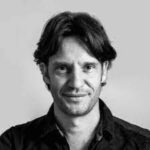 “Machiel loves to help you realize your dreams”
“Machiel loves to help you realize your dreams”
Machiel founded the organization Jung Platform based on a night-time dream. This organization focuses on providing quality programs for personal development from a soul-centered perspective. Machiel is an internationally-recognized and gifted dream worker. His book Dream Guidance, published by Hay House shows how one can connect and find guidance from the soul through dreams. He further travels extensively to Africa, Europe and through the United States and lectures on soul oriented psychological topics. He has also been a mental health therapist since 2006.
Machiel Klerk is a social entrepreneur, licensed mental health therapist, international speaker, dream worker, and published author.
Love the show? Subscribe, rate, review, and share!
Join The Coca-Cola CMO Leadership Summit Podcast community today:
dream interpretation, healing trauma, personal development, psychological x-ray, spontaneous dreams, unconscious mind